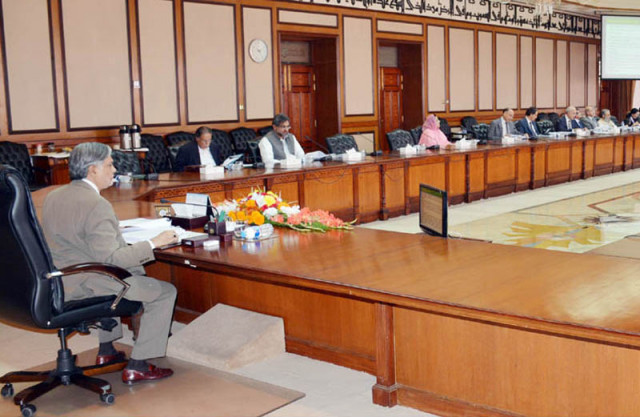Power transmission lines: Blanket tax exemptions on investments for 10 years
Govt rolls over Rs136b loans that were earlier obtained to retire circular debt.

The federal government has extended blanket tax exemptions on investments in the power transmission lines for a period of 10 years, while also rolling over loans worth Rs136 billion that were earlier obtained to retire the circular debt.
The decision to extend tax exemptions was taken by the Economic Coordination Committee (ECC) of the Cabinet and was aimed at attracting investments in the dilapidated transmission network of the country.
Headed by Finance Minister Ishaq Dar, the ECC also gave fresh sovereign guarantees to facilitate Pakistan International Airlines to borrow Rs12 billion and slapped 20% regulatory duties on the import of wheat.
It also increased margins of oil marketing companies on petrol and diesel along with dealer margins. The decision will result in a minimum 80 paisa per litre increase in petrol and diesel prices.
While considering a draft policy framework for the private sector transmission line projects, the ECC approved corporate tax exemption for 10 years with instructions that the companies concerned would file tax returns, according to a handout issued by the finance ministry.
The ECC allowed tax exemptions in turn over tax for a period of 10 years. Further, withholding tax on income was also exempted. However, the economic decision-making body decided that general sales tax on imports by investors would be adjustable.
Unlike the blanket tax exemptions to Independent Power Producers (IPP), the exemptions for the transmission line investors would be limited to only 10 years, said Federal Board of Revenue Chairman Tariq Bajwa. He said the tax on dividends will be 10% for transmission projects against 7.5% for IPPs.
The ECC directed the National Electric Power Regulatory Authority to finalise a tariff petition within a month for transmission lines without the re-opening of tariff obtained through international competitive bidding. The government is opening the transmission lines for the private sector for the first time.
Debt rollover
The ECC rolled over the syndicated term finance facility of Rs136.5 billion for another two years which was obtained two years ago to retire circular debt. The rollover will have no impact on the existing stock of the circular debt but it will increase burden on the budget on account of debt servicing cost. The government is paying interest rates to banks over and above the Karachi Interbank Offered Rates (Kibor).
The ECC also imposed 20% regulatory duty on wheat imports. The decision was taken to preserve foreign currency reserves.
The ECC was of the view that there was no justification for increasing imports as the crop yield for wheat in the country was reasonable, however, the decision is in violation to commitments given to the World Trade Organization.
Pakistan International Airlines
The ECC approved sovereign guarantees for facilitating PIA to obtain Rs12 billion in loans so that the national flag carrier can meet its critical requirements, the terms and conditions of the loans will be determined in consultation with the finance ministry. The increased lending to PIA has stretched National Bank’s balance sheet, according to officials.
Increase in margins for OMCs
The ECC increased the OMCs’ margin on petrol by 12 paisa and by 49 paisa on diesel while the dealers’ margin was increased by 30 paisa per litre. The move will increase the overall prices by about 80 paisa. The OMCs were taking Rs1.89 per litre margin on high speed diesel before the increase. The commission for dealers, currently at Rs2.30 per litre, has been proposed to be jacked up to Rs2.60 per litre.
The ECC approved a policy framework for on-site projects based on interim gas supply. The proposal is aimed at interim utilisation of over 200 million cubic feet per day (mmcfd) of natural gas available at various gas fields which cannot be injected into the pipeline system in the near future, due to the time required for the establishment of gas production.
Published in The Express Tribune, October 31st, 2014.
Like Business on Facebook, follow @TribuneBiz on Twitter to stay informed and join in the conversation.



















COMMENTS
Comments are moderated and generally will be posted if they are on-topic and not abusive.
For more information, please see our Comments FAQ